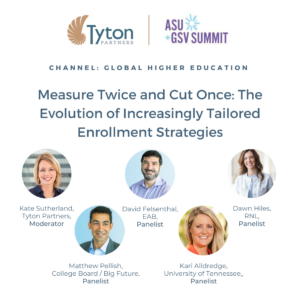Parents and students are attracted to 3-year bachelor degrees, but can institutions make the business model work?
September 23, 2025 BlogDifferentiation is going to be critical for colleges and universities to compete, and more than 60 are now…
ASU+GSV is one of Tyton’s favorite conferences. Not only do we get to see 4,000+ of our closest collaborators, but we also meet new people who are making waves in education and learning from them every year.
This year, our higher education team is moderating two panels. We can’t wait to see where the conversation goes and what knowledge will come out of these discussions.
 In prior decades, the higher education community has organized itself around reform objectives with clear calls to action. In the past, improving access to a college education and working to improve college completion were calls that unified much of the higher education community. A variety of challenging dynamics, from evolving student demographics and stranded student debt to concerns over the value of the degree to eliminating the college degree as a job requirement to calls for increased regulation, have left the sector and those who work in it feeling beleaguered. What will be the call to action of the coming decade? There are powerful cultural, political, economic, and technological catalysts for change at work.
In prior decades, the higher education community has organized itself around reform objectives with clear calls to action. In the past, improving access to a college education and working to improve college completion were calls that unified much of the higher education community. A variety of challenging dynamics, from evolving student demographics and stranded student debt to concerns over the value of the degree to eliminating the college degree as a job requirement to calls for increased regulation, have left the sector and those who work in it feeling beleaguered. What will be the call to action of the coming decade? There are powerful cultural, political, economic, and technological catalysts for change at work.
This panel will explore what higher education is becoming across the next decade from the perspective of three critical stakeholders: learners, employers, and society at large.
Gates Bryant will moderate this panel, where we’ll tackle the following systemic shifts:
Barbara Mistick of the National Association of Independent Colleges and Universities, Ted Mitchell of the American Council on Education, Stephanie Khurana of Axim Collaborative, and Courtney Hill McBeth of Western Governors University will bring their diverse backgrounds and the perspectives of their organizations to bear on casting a future for the higher education sector.
 Institutional leaders are facing enormous pressure to evolve their enrollment strategies to successfully compete with a shrinking population of traditional four-year students. For the majority of institutions, the key challenge is to identify the most effective methods – frequently in collaboration with enrollment management partners – to catch prospective students’ attention and highlight their unique missions and value propositions. With limited marketing budgets, there’s little room for experimentation and failure.
Institutional leaders are facing enormous pressure to evolve their enrollment strategies to successfully compete with a shrinking population of traditional four-year students. For the majority of institutions, the key challenge is to identify the most effective methods – frequently in collaboration with enrollment management partners – to catch prospective students’ attention and highlight their unique missions and value propositions. With limited marketing budgets, there’s little room for experimentation and failure.
This panel brings together the perspectives of institutional leaders and enrollment enablers to discuss the forces at play over the next few years and how institutions should tailor their strategies to precisely align with students’ evolving interests and expectations.
Kate Sutherland will moderate the discussion and offer some of our own perspectives on the state of play in the enrollment management world. For example:
Kari Alldridge of UT-Knoxville, David Felsenthal of EAB, Matt Pellish of CollegeBoard/BigFuture, and Dawn Hiles of Peoplegrove will roll up their sleeves to discuss some of the thorny issues facing college admissions.